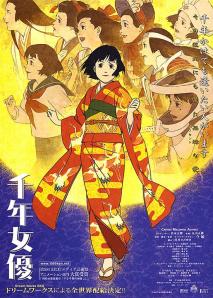Back when I did a short stint on WordPress I typed this up. About a year has gone by since Satoshi Kon, one of my favorite directors, passed away. I think it's a poignant time to take a look back at this entry for all the readers who may have missed it. Let us never forget the works of a man who truly was a master and innovator of his craft.
Early today it seemed the Twitter world - who would have guessed- was all about about Satoshi Kon, revered anime director of Perfect Blue and Paprika fame. Reports started cropping up that on August 23rd, one day ago, the director passed away suddenly at the age of 47. I had the chance to see Kon's Paprika during its 2007 theatrical run, my first film from the director, and was instantly floored not only by the sensory overload but also by the intricate plot and essential love letter to cinema that had been sent. After seeing this film I made it a point to check out the rest of the man's work, and much to my surprise I had already previously fallen in love with the visionary's creation without even being aware. Kon's series Paranoia Agent ran on [adultswim] and had initially turned me on to the power of anime as a storytelling medium. Kon existed as a storyteller in the purest sense of the word.
I have developed tremendous admiration and respect for Kon since seeing Paprika, but it was not until I was able to begin exploring his filmography more in depth that my love for Kon as a director grew. As such, I would like to take a quick look back, in respect, on one of the most best directors to ever live.
Perfect Blue
In 1998 Kon debuted what I consider to be his best film, Perfect Blue. An in depth examination of fame and identity perception, the film set up one of the director's primary fascinations for years to come: the tension between reality and mental stability. Directors like Christopher Nolan are credited with weaving intricate tales of flash designed to make the viewer question the outside world, but Kon takes this concept and places it in a realistic setting to establish a distinct unease that is much more reminiscent of classic filmmakers like Alfred Hitchcock. The thriller is so incredibly tense and well constructed that even in his early efforts Kon displayed the mark of a master.
Millennium Actress
Much more intimate than his debut feature, 2001's Millennium Actress allowed Kon to continue to build on his unique visual style, using time and flashback to compliment the sentimentality at the film's center. A brilliant examination of the choices we make in life and the difference in perspective that expectations can create in people offers a stunningly attached examination of humanity and solidifies Kon's ability to resist being classified as another flashy anime director without the substance to sustain full length feature.
Continuing the more 'realistic' nature of his previous film, Kon released Tokyo Godfathers in 2003, a fresh take on John Ford's classic 3 Godfathers. Instead of steeping the film in cinematic tradition, Kon's contemporary take shows the man's socially conscious side by exploring ideas of gender construction and Japanese class structure. The film also explores the construction of family and the role that family, traditional or otherwise, plays in each individual's life. But Kon does not allow these aspects to hinder his unique story telling style, having the plot capable of standing on its own while still enhancing these tangential concepts. All leading toward one of the most thrilling conclusions in cinema, giving the impression that the real story has only just started.
Paranoia Agent
And then in 2006 came Satoshi Kon's masterwork, the 13 episode series that allowed the director to explore the interconnectedness of individual's lives and the nature of fear set to the backdrop of a string of serial murders at the hands of the vicious Lil' Slugger. Building on many of the ideas that Kon had started exploring years earlier in Perfect Blue. The series is mysterious, intricate, and thrilling while also allowing Kon to inject a number of major fourth wall shattering moments that add another layer of intrigue to the anime series.
Paprika
Yet it was in 2007's Paprika that all of Kon's previous successes came together in the most coherent and stunning of fashions, demonstrating that the director had seemingly started to peak in terms of artistic vision and cinematic excellence. Building on many of the psychological elements found in Perfect Blue and Paranoia Agent, the director used dreams as a means of exploring the human psyche, set as a beautiful counterpoint to Inception. And what do we find in the minds of these inhabitants? Loving recreations of classic films and cinematic tropes, recalling Millennium Actress, with the usual technical prowess and imagination that Kon developed fame for over the course of his previous four projects.And amidst all the parades of frogs, dreams running wild, and buildings collapsing is a beautiful central romance of human connection that Kon worked with in Tokyo Godfathers. Not to mention that this film, like all of Kon's other works, is anchored by a strong, fleshed out female protagonist who exists not as a sex object but as a person. Standing as one of the most unique and entertaining films that has ever been created, Satoshi Kon's Paprika truly is a cinematic tour-de-force.
A master of his craft. I count Kon as the greatest director of animation to ever live. The man is a reason that I found a passion for cinema, joining a fairly small list of contemporary filmmakers who have influenced me in such amazing ways, and since the release of Paprika I have closely followed any sources I could find to see exactly what project he would take on next. It seems that Kon had planned to continue building on the ideas he had worked with in previous films by directing The Dream Machine, a logical step for a filmmaker who was constantly toying with fascinations and progressing the thoughts these fascinations spawned. Writing Kon off as a director of animation is not only unfairly belittling of his craft - the viability of animation as a serious form of film making - but also does not allow me to fully give credit to Kon as one of the best directors to ever live. He had such insight to the craft of film making and the human mind, insight that the greatest of artists have channeled to make, just as Kon did during his time, the greatest works of artistic expression. It is with great sadness that I write this post knowing that, with the death of Satoshi Kon, an artist fascinated by fancy, the world will not be able to experience any more of these new, beautiful dreams. My best wishes go out to all members of Kon's family.
Rich
Comments are welcome and, for anyone with a literary mind, I encourage checking out my poetry blogfilled with all original works for your reading pleasure. Or if video games are more your thing, I have a blog dedicated to all gaming news, reviews, and opinions.
Also, I am on the old Twitter thing so I guess you can follow me at twitter.com/FLYmeatwad.
And if you want to know what I'm watching, listening to, playing , and reading you can follow my tumblr account!
© 2011 Richard James Thorne






No comments:
Post a Comment